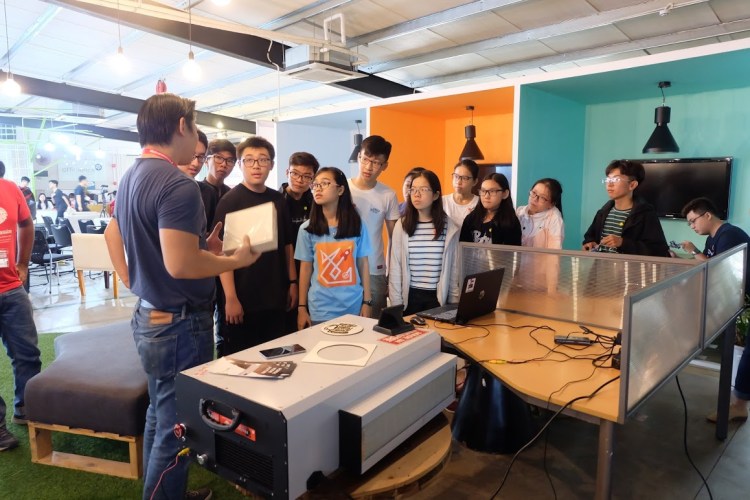UNESCO Hackathon at FOSSASIA Summit 2019
As part of the celebration of the International Year of Indigenous Languages, the UNESCO and FOSSASIA once again joined hands in organizing a hackathon titled “Hack the Future”, aiming to preserve indigenous languages through free and open source software. The event took place from Mar 15 to Mar 17, during the FOSSASIA Summit 2019 at Lifelong Learning Institute, Singapore. The competition recorded a number of 193 registered participants from across Asia and neighboring regions. 15 projected ideas were submitted and 13 of them were pitched for 5 winning prizes.
The winning projects
For the expected outcome of the hack, the applications or games shall help to provide greater access to multilingual information and knowledge and enable knowledge-sharing and dissemination of good practices, specifically with regard to indigenous languages. All work shall be FOSS/Open Source and use or connect to FOSSASIA projects (APIs) and technologies to improve people’s lives and tackle indigenous languages and culture protection challenges.
The teams that met requirements and produced convincing solutions were:
- Open Science Prize: Gadon
- AI Dev Prize: Crowd-sourced Corpus Generation
- Cloud Prize: Guageland
- Indigenous Prize: Thazin
- Audience Prize: Crowd-sourced Corpus Generation
Crowd Sourced Corpus Generation: the 5-member Indian hack team has built a crowd-sourced corpus generator that provides reliable crowd translations using AI matrix. The app contains of 2 major parts: (1) users’ translations input and (2) a platform where researchers and/or indigenous language experts can verify and give feedback on crowd translations.

Thazin is a mobile game project whose inspirations derived from flappy bird and Google Chrome’s “not connected” dinosaur game. In this game, a player needs to use particular indigenous languages to speak into the built-in microphone in order to get the bird to overcome obstacles of each level. The dataset is also generated from indigenous people themselves when they record their voices for players’ references.

Gadong is another mobile game application designed to tackle the inadequacy of online resources for indigenous languages by providing a crowd-source dictionary for Khmu language. Gadon project not only aims to promote Khmu language to the public but also helps the Khmu people to learn English as a global language.

GuageLand game application allows players to level up by learning and solving problems related to indigenous languages. The project is fully open source featuring technologies such as: SUSI.AI, react.js, node.js, Amazon-DynamoDB, html5, css3, javascript, NoSQL Database, PWA, and open data.

Participants, mentors and judges
The UNESCO Hackathon at FOSSASIA Summit 2019 received the participation of 193 candidates from 21 countries all over the world. Indians accounted for the largest number of participants (82), followed by Indians (62). And more than 20% of the participants were females.
Mentors
Seventeen open source advocates from Singapore, India, Vietnam, Sri Lanka, Germany, and indigenous experts from the Mekong region were invited to become mentors of the two-day hackathon. Mentors dedicatedly worked alongside with participants, giving them constructive feedback on the groups’ projects as well as showing them how to turn their ideas into feasible mobile app solutions. Some indigenous experts also joined the hacking projects as participants resulted in great diverse backgrounds of team members for each team.
Judges
The Hackathon jury consisted of UNESCO delegates, indegious languages experts and representatives from FOSSASIA, Microsoft, IBM, SUSI.AI and OpnTech. Some members from the jury board were mentors themselves. Thus, they not only provided support, made final evaluations on submitted projects but also encouraged participants to carry on their research after the completion so that they can implement the applications into real life situations to empower the indeginous languages and culture through FOSS.
Conclusion
The event was another great achievement for both partners based on the quality of projects’ outcomes and the awareness of the concepts raised before, during and after the competition. With the support from UNESCO nominated indigenous experts, the young developers successfully developed innovative open source applications that support the dissemination of good practices with regard to indigenous languages and increase access to multilingual information and knowledge by leveraging open data and knowledge-sharing.
Links
Hackathon sessions at FOSSASIA Summit 2019: https://youtu.be/J53lT5IhkjY
FOSSASIA Summit 2019 Photos: https://photos.app.goo.gl/zrJnma6s1a1xPCu89
FOSSASIA on Twitter: https://twitter.com/fossasia
FOSSASIA Videos: https://www.youtube.com/fossasiaorg
FOSSASIA Calendar: https://calendar.fossasia.org













You must be logged in to post a comment.